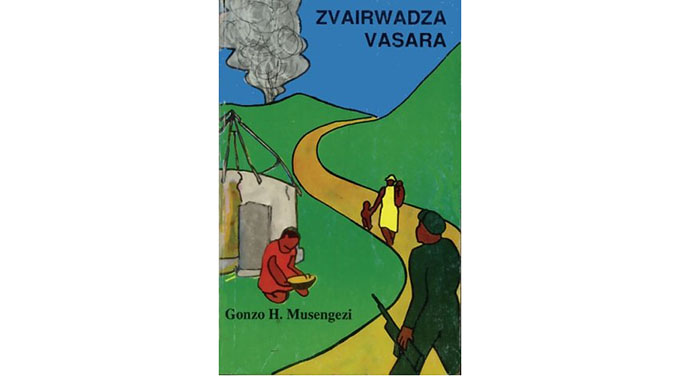Exposing The Honourable MP’s hypocrisy
Elliot Ziwira @ The Book Store
The villagers in his constituency are suffering from drought, “rain drought, crop drought, Chief drought and MP drought”, as poverty lies bare at their doorsteps, and the sky remains as unyielding as the political landscape of their existence.
With their patience waning, and lack playing hide and seek with their souls, the people besiege Government offices, to express their dismay on the conspicuous disappearing act of their Honourable MP; and to their chagrin, they are told that they can only remove him through the ballot box.
With elections still a long way to go, the disgruntled constituents will have none of it; but are they really in a position to do anything if the rug is always pulled up each time they attempt to make the first step, and democracy wears so many five-year shades?
Such is the quandary that the villagers in Honourable Shakespeare Pfende’s constituency of Mhondoro find themselves in, in Gonzo H. Musengezi’s hilarious play “The Honourable MP” (1984).
The playwright adeptly satirises the tragedy of the newly independent post-colonial nation state that suffers both internal and external dialectical tensions in its quest to fashion an authentic ideological vision that can steer it forward. However, because of individualism, avarice, corruption and ideological mistiness, the nation state remains in colonial swaddling clothes, as the empire and all that it stands for is mirrored in the leadership’s glorification of all that is Western.
Using a thin cast of five characters – Honourable MP Pfende, his wife Immaculate, his mistress Isabella, Mr Choto, who is a teacher at a primary school in the MP’s constituency; and Spencer, a domestic worker; Musengezi evocatively explores the deceitful and hypocritical nature of power. The use of ritualistic aspects of drama, that follow a tripartite sequence as outlined by Allison (1986), heightens dramatic irony and brings the audience closer to the fictional experience depicted.
The realistic dialogue used draws the audience in through shared meanings, which are timeless and infectious.
Although it is only two years into Independence, the nation state is already burdened by a literal and metaphorical drought; a situation that Mbembe purveys in his philosophical book “In the Postcolony” (2001), and Fanon lambasts in “The Wretched of the Earth” (1967). As the play opens, Isabella, Pfende’s girlfriend, is alone at his Highlands mansion, because his three children are studying abroad and his wife has gone on a “business” trip.
The reader is taken into the affluence of the place through Isabella’s movements and descriptive language. Most of the furniture in the house is imported.
In a twist of events, Immaculate returns, unexpectedly the same night; by now Pfende has returned home with the Teacher. Through skilful handling of suspense and surprise; the very essence of drama, Musengezi hilariously exposes the moral bankruptcy at the core of both the familial and national discourses. Without scruples, Honourable Pfende lifts Isabella and sits her beside the Teacher, takes stunned Mr Choto’s hand and puts it around Bella and implores him to play ball; in the end the “couple” is given a bedroom as Mr and Mrs Choto; much to the disappointment of the Honourable MP.
It turns out that Pfende has abandoned his constituency, bought himself three “European houses” in Highlands, Greystone Park and Vainona, a dairy farm in Beatrice, plus a fleet of cars; the chief has also left for Chegutu, where he bought himself a “European house” and a car, similar to those used by MPs. Burdened by “rain drought, chief drought and leadership drought”, the peasants decide to send the Teacher to the city, to impress on the Government their despondency.
Juxtaposing opulence and abject poverty, the dramatist takes the reader into the private space of the MP, who has become wealthy overnight, despite his low level of education, because of his links to power. He also is not a veteran of the liberation struggle; and even disdainfully pokes fun at the veterans of the struggle.
The audience learns that he smuggles gold, emeralds, ivory and other resources through his wife, and smuggles in prohibited consumer goods. He is also a local director of seven multinational companies. It is such wanton disregard of the common good that impoverishes the people, who forever wait for a chance to bogey with Utopia. They want the Government to give them another MP, but the nature of democracy says they should wait for elections. When they tell their National Assembly representative of how disillusioned they have become, he threatens them, because he believes that someone is inciting them.
To him they are only simple villagers, who cannot decide on their own what they want. Instead of responding to the issues that they raise, he sees an invisible hand driving them to mutiny. But the people are aware that he “practises socialism by day” and “capitalism by night”, and that he dabbles in self-enriching shenanigans. They surely are not docile as Fanon (1967:154) puts it that: “The people come to understand that wealth is not the fruit of labour but the result of organised, protected robbery.”
Like Chief Nanga in Chinua Achebe’s “A Man of the People” (1966), Pfende believes that he is “a man of the people” when in actual fact he is for himself and his family. Politics to him is a feeding trough and servant leadership doesn’t exist in his vocabulary. He is so morally deceitful that he boasts about his debauchery with university girls young enough to be his daughters, to his girlfriend, Isabella, who he later impregnates and dumps; and the Teacher.
But as Fanon (1967:161) points out “the collective struggle presupposes collective responsibility at the base and collegiate responsibility at the top. Yes; everybody will have to be compromised in the fight for the common good.” For the nation state to prosper for the common good, everyone must put shoulder to the wheel; there are no two ways about it. The politician must know that if he continues playing the game using his own rules, he will surely lose, as what happens to Honourable Shakespeare Pfende, when the people gang up against his excesses.
When he tries to sell them the usual sloganeering and electoral promises Peasant 1 challenges him: “Don’t be cheated. Don’t be cheated. We have heard that for many years now. What did we see? Electric trains, yes, but what hungry man needs an electric train? A secondary school, yes, but one which we built with these hands of ours.” Indeed, what hungry man needs bullet trains, village airports and all those pies in the sky?
Through collective effort, the peasants are able to wrest the gun that the MP draws to intimidate them into silence, read out his charges and tell him that they may be simple folks, but they are not idiots. As it dawns on him that he has indeed come to the end of his political tomfoolery, Shakespeare Pfende – the Honourable MP – faints, and his wife takes to her heels for dear life; leaving the people to celebrate their victory.
Probably the rustic character Spencer succinctly puts everything in context when he pours out his heart on Pfende, in the presence of the Teacher, Isabella and Immaculate that in his view Baas Heberdeen, “a white man” whom he had worked for for “30 years” was more generous than him and his mean wife, Immaculate. He would give him clothes and other presents, and Immaculate would give him a pint of milk and half a loaf of bread on a daily basis, whereas they gave him nothing.
He rubs it in: “African oppress African now. This Independence, a-yah. Tichatambura stereki.” Spencer may fail to realise that he remains with nothing to show for the 30 years he laboured for “Baas Heberdeen”, and that Independence from the colonial yoke is worth celebrating, but he is aware of the individualistic and selfish nature of Pfende and his wife. To him nothing much has really changed, except maybe the skin colour of his oppressors, who however don white masks.
It is this lack of consideration for others, avarice, corruption and hypocrisy at the core of the “native bourgeoisie” who becomes one “species of men” replacing another “species of men”, as Fanon (1967) puts it. I-n a nutshell, Musengezi is contemptuous of and prophetically depicts and offers solutions to by reminding politicians that the people matter in their continued quest for power in “The Honourable MP”.








Comments